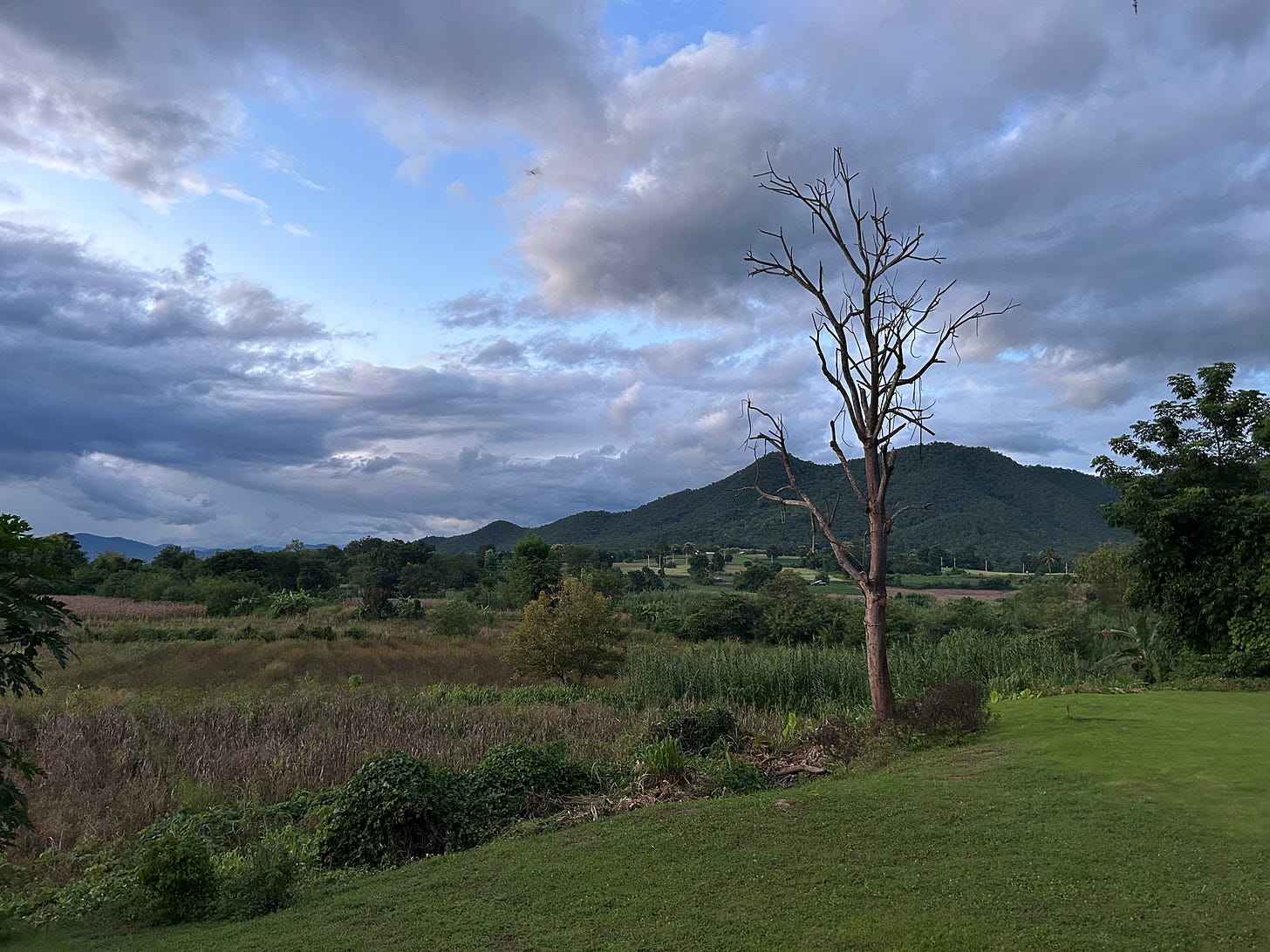Temples, Paddy Fields and Inept Sparrows: Thailand: Part 2
Wildlife, jewelled countryside and intricately carved temple decor abounds in Northern Thailand.
I am hand washing knickers in the sink. Again. I’d forgotten how much hand washing of underwear is involved in long holidays. I squeeze out as much water as I can and drape pants from door handles, hangers, cupboards and shower rails all around our hotel room. Hopefully, it won’t take 3 days to dry like the last batch.
We are on the outskirts of Chiang Rai, in a large corner room of a hotel with a terrace outside. We leave wet shoes and umbrellas propped up by the door. I smell various tops and sort them into three piles: Totally unwearable, medium stink - could get away with once or twice more - and clean. Chores completed, we head out for The White Temple.
Although a bit ‘templed out’, this one gets amazing reviews and it is certainly the most ornate we have come across. Somewhere between a giant intricately frosted wedding cake and a silver gingerbread house, it is quite stunning. Yet, amongst all this excessive decor, there are signs of a darker side, a recognition that life is messy and not as simple as religion might have us believe. At the entrance, there are hands reaching up from the ground in despair. The desperate carved fingers make me shudder but also seem to provide a counterpoint to the frivolous trappings. Two huge gorgons sit creepily either side of the bridge to the main entrance and in the grounds to the right, an other-wordly, alien, dragon-like creature spews water, with a sea monster clasped in its left hand. The whole thing is like a fairy tale, both sickly sweet, luring you in, yet with stark reminders of evil lurking nearby. Overall, we find it the most engaging temple visit so far. Little details around the site continue to grab our attention. The traffic cones with plastic skulls atop, plant holders that have melting faces sculpted into them. It seems like someone had a sense of humour when designing this place.
To top the entire thing off, I visit the toilets. They are set in a gold building that looks like a work of art. Inside, the decor is all gilted, from the intricate curving borders on the walls, to the shimmering tiles in the cubicle. I have never emerged quite so delighted from a visit to a public bathroom.
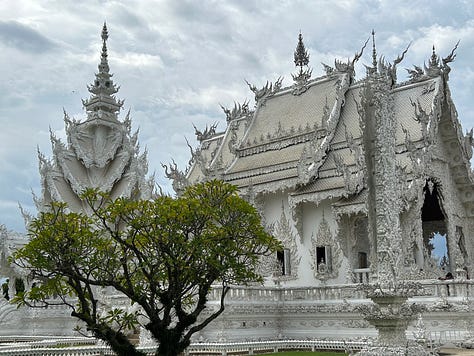

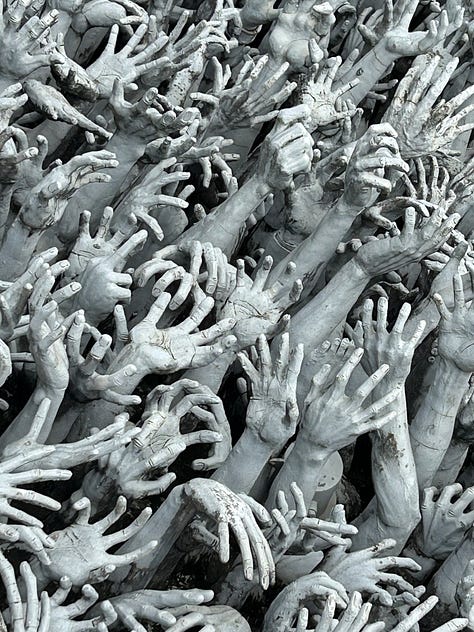


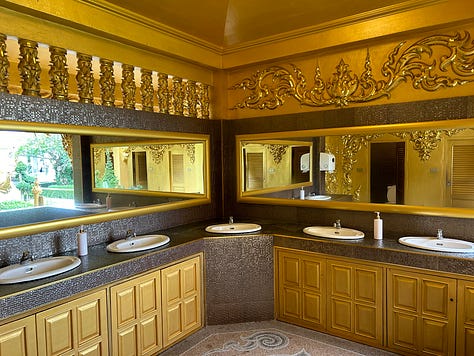
***
Google maps has provided us with a route from Chiang Rai to Lampang. It looks straightforward but as we come off the motorway and head in a different direction from the road sign clearly pointing out the town, we become dubious. We drive through small villages, past paddy fields until buildings and dwellings become sparser. Ultimately, we find ourselves on a red mud road, which really requires that people idiotic enough to travel along it are in a four wheeled drive. I get out of the car so that M can maneuver it over bumps, potholes and ridges. As I am standing there frowning, I hear another engine approaching. It gets louder until a couple on a moped come into view. They slow down, staring at me and the car, perplexed. I half smile at them and think they are going to veer around us and continue but they stop the bike and they both get off. The woman talks to me in Thai, asking me what I can only assume is ‘Where are you going?’ Or maybe, ‘Are you lost?’ Possibly, ‘What are you doing out here, you silly tourists?!’ She looks concerned.
Feeling idiotic, all I can say is “Soahdee. Lampang?” I repeat ‘Lampang’ several times. They both shake their heads and point back in the direction we have come from. I catch the word ‘kampana’ and deduce that up ahead is a village only. We employ a lot of sign language, ultimately resulting in M turning the car around further up the path. The woman remains standing by the side of the track with two big bags, while the man gets back on his moped. He signals that he will show us the way and, overwhelmingly grateful, we smile, wave and repeatedly call, “Capcoon!”
He drives slowly on his moped, stopping when we get too far behind, until he guides us all the way back out through the villages and paddy fields to the main road leading to the motorway. He motions in the direction of Lampang. We repeat our thanks to this kind stranger and wave goodbye.
***
I am at a loss to explain why there are so many enormous wooden penises for sale in the gift shop at the Opium Museum in the Golden Triangle, but there are. A lot. Varying sizes and detail. Are they ornamental? Or for practical use? One is so heavy I can barely lift it.
***
“Looks like elephant’” our guide, Han, announces as she holds up the paraffin lamp in the darkness. It spreads a weak circle of light which splashes onto the rock formation in the heart of the cave and we can make out ears and a trunk. We have also been shown popcorn, a monkey’s head, a UFO and two frogs.
Lom Cave is an hour’s drive away from Pai. The river seems to run into the entrance of the cave and fish wrestle over each other, mouths agape for food as we cross the small wooden bridge. At times, the river runs high, flooding the cavern and keeping everyone out.
Long bamboo rafts wait in the silent gloom as we step underneath the rocky overhang. We board one and the three of us sit on the tiny wooden seats, one behind another, as our boatman punts us through the shallow water. Stalactites hang from the uneven ceiling, like dripping, elongated canine-teeth, emanating an eerie beauty. We reach the other side of the water and I navigate the bamboo unsteadily, stepping down onto enormous bags of Jasmine rice, embedded in the muddy surface to make a pathway. Han, lamp held aloft, takes us up a steep staircase until we emerge into a large space. The rock and mineral formations are otherworldly, pouring and swirling in beiges, roses and pale hues. Alien life forms seem to emerge from the walls as the flame catches them, long fingers reaching to the ground. There are organic, geometric patterns cut into rocks, bubbling, streaming and merging.
The darkness that envelops us just outside of the lamp’s halo seems to make this even more magical, softening the atmosphere and elevating the silence. Our voices seem too loud and we begin to speak in whispers.
Tiny bats fly about us, disturbed from their roost. M and I are delighted to see an enormous spider just sitting on a stone surface. We try to list what it might eat. Later, I will google cave spiders and discover that there are many different species. Apparently, there are generally a lot of troglodyte animal species, officially referred to as ‘troglobites’. I say the word over to myself a few times.
We glide back across the water on our bamboo raft, stagger back onto the brighter bank and emerge into the daylight, momentarily stunned and blinking.
***
We are sitting in a cafe suspended above the paddy field on stilts. We walked down a wooden bridge to reach the seating area, hot boards burning the soles of our feet. We sit gazing out at the multi-faceted mountain in the distance, while the emerald-jewelled blades of the rice glow iridescent, like a luminous sea spreading around us.

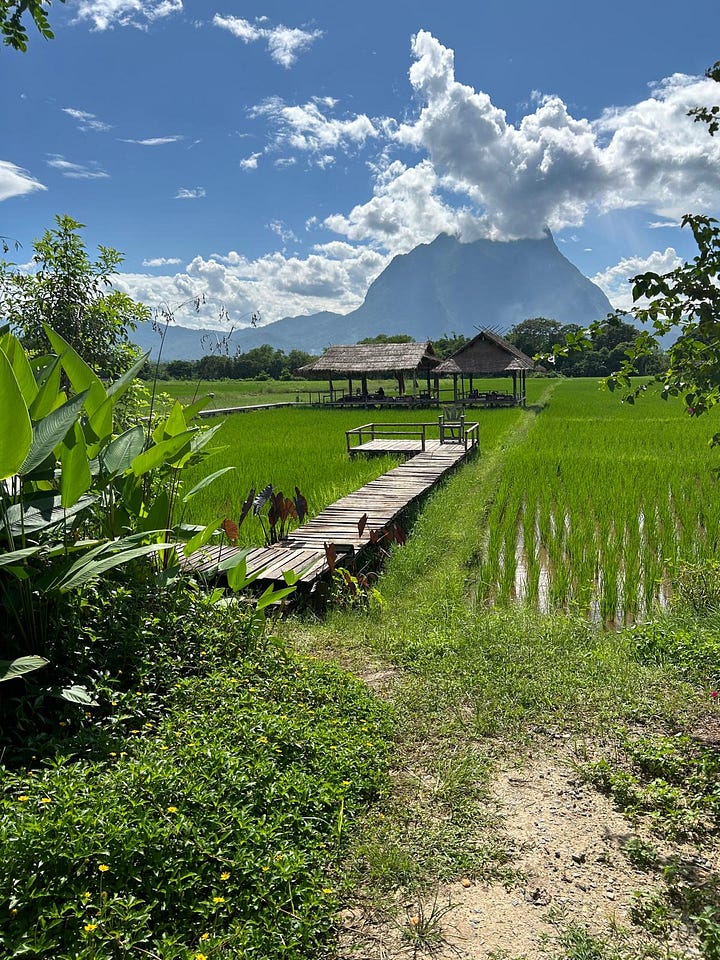
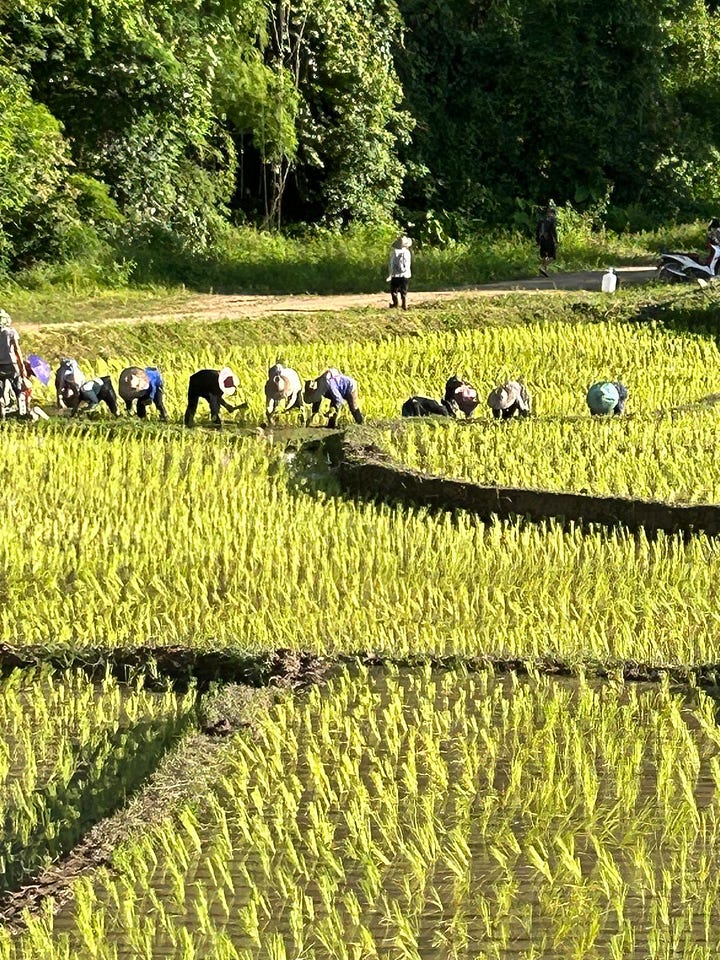
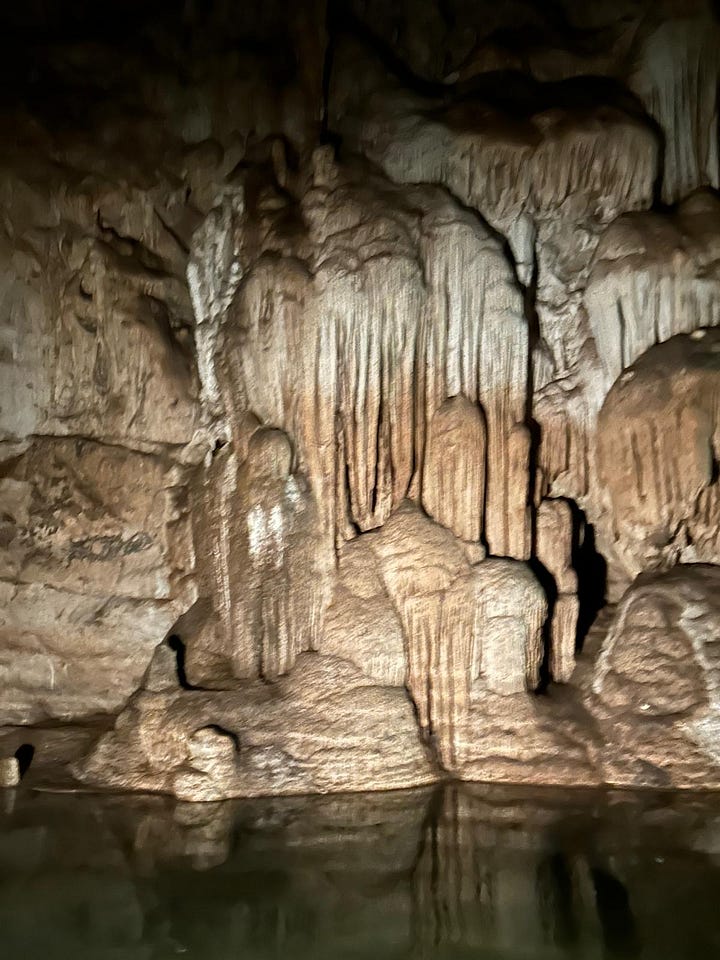
***
The sum total of the Thai we have learnt is, to employ understatement, not extensive. It’s taken me almost two weeks to master ‘hello’. ‘Thank you’ is easier, but as I listen to a youtube of essential Thai phrases, I realise it is not as straightforward as it seems. In Thai, there are polite particles that go on the end of phrases. If you are female, it is ‘ka’; if you are male, it is ‘kap’. So, ‘thank you’ - ‘capcoon’ - becomes ‘capcoon-ka’ if you are a woman or ‘capcoon-kap’ if you are a man. M is not pleased about this. He prefers the female version. He is also sure he has heard men say ‘capcoon-ka’. I wonder how this linguistic feature is navigated by a non-binary Thai speaker.
We are in an electronics store, looking for an ipad stand for M. The guy in the store doesn’t have one and despite speaking excellent English, humours our attempts at basic thai. As we leave, he says, “Capcoon-ka”. We are confused. Isn’t that the female particle?
Back at our hotel, we ask the receptionist about it.
“Yes, ka is for women,” she says “but sometimes men say ka if they are gay.”
“Ahhh”, M and I croon.
“Or if they are flirting,” she adds with a smile.
“Oh, well, that was it then - he was flirting with me,” I announce, delightedly.
“Yeah, I think he was gay,” M counters, “and flirting with me.”
Our receptionist laughs at us. She is tired - she’s been up all night and all day and wants to go home. She is young, intelligent, bilingual at the least. I find myself wondering where life will take her as I wish her a relaxing time off.
***
There is a waterfall near Chiang Dao, Sri Sang Wan, which is popular with locals. We get there by driving along roads next to longan orchards, walking along a path through the forest and over a river on a little bridge. It brings you out at a small clearing overlooking a petite cascade of water which gushes along the rock slabs on the river bank. When we go, there are three people there; two women sit, opening boxes of food, while a man strolls through the shallows. We feel we are intruding on their solitude.
I read a sign that is pinned to a tree: “At this spot the community gather every year in the full moon night of the ninth month of the Northern Thai calendar to perform the worship ceremony of Ghost Khun Num (The Stream Spirit).”
***
I am lounging about by a small outdoor pool at our guesthouse in Lampang. Above my head is a corrugated tin roof on metal supports, shielding me from the sun. Between one of these metal supports and the roof, in a little triangular space, a sparrow perches. It has been up there for a while now, wrestling with a long blade of grass. Its mate appears and tries to help wrap the stem around the post. The grass sails down and lands on the ground. The sparrows sit looking down at it, seemingly perplexed. One of them retrieves it and spends the next half an hour battling with the piece of grass. The other one flies off for minutes at a time, presumably to look for more material, but returns empty-beaked on each occasion.
“They aren’t the world’s best architects”, I murmur to M.
On the ground are bits of dried up interwoven grass and leaves. It seems this is not the sparrows’ first attempt at home construction. Before I leave the pool, I strew a few bits of grass around in case they need some help.
The next day, the grass remains on the ground by the pool and the sparrows seem to have abandoned their potential site.
“They’ve realised it’s too much hard work and have decided to rent instead,” M declares. They certainly seem like prime candidates for a bird box.
***
Time seems to speed up as the holiday continues and, suddenly, the end seems to loom over us like a heavy shadow. Despite taking boat trips, eating lovely food, seeing new things, I am aware of a sense of inevitability which seems to oppose the excitement of what was unwritten at the start of our visit.
Travelling around seems full of small endings and new beginnings, as you leave each place and become familiar with what was once unknown. A bit like the sparrows, we leave one place to go and seek out another.
I know new starts and experiences will continue back in the UK, but perhaps with less of the glow and shine we have experienced in Thailand.
As we pack to leave, we stuff our suitcases with soy sauce, nuts and tamarind sweets, perhaps hoping to ingest this holiday back in England, almost locking it within us tangibly at some future point, like emotional and physical nourishment.




